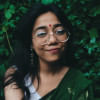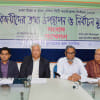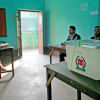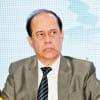‘The right to fear-free democratic opposition must be ensured’

Shantanu Majumder, a professor of political science at the University of Dhaka, talks about his thoughts on Bangladesh's recent national election and its implications on society and opposition parties, in an interview with Afia Jahin of The Daily Star.
What are your thoughts regarding the January 7 election?
Whatever was predicted as the outcome of the national election turned out to be true. The implications of the election will span not only the country, but the South Asian region and even on an international scale. Compared to the previous two elections, the 12th parliamentary election received the most international attention.
From those in power, one thing we should hope for is that there is no post-election backlash. That is, the parties that chose not to participate in the election should not face intimidation or attacks. Moreover, these differences and the hostility between political parties must not affect society at large.
The existence of tensions, resulting from the nature of the election, cannot be denied. One major party was not satisfied with the election and thus boycotted it. So it would be absurd to think that, now that the election is over, they will accept defeat and react graciously. This prevailing reality must be acknowledged.
What are your expectations from the new government?
I am not saying that actions shouldn't be taken against anti-democratic elements and anti-democratic actions in the name of preserving the rights of the opposition. And I also do not adhere to the cliché notion that someone who belongs to the opposition camp is by default an angel and the people with the ruling party are en masse wrongdoers. But, be it the opposing party or whoever, so long as they are not spreading disinformation or engaging in violence, they should not be harassed or subjected to false cases or violence.
Unfortunately, there is a section of unrestrained, uncontrolled government party activists who chant "Joy Bangla" and "Joy Bangabandhu" before initiating an offensive. I doubt whether these miscreants uphold the ideals of Bangabandhu. This section has existed for a long time. One can hope for a new start this time around, wherein this section can be reeled in internally.
What is your opinion regarding the demands of BNP (the main political opposition) and the future course of opposition parties in Bangladesh?
I know of two key demands of the opposition before the election—the stepping down of the prime minister and the reintroduction of the unelected election-time caretaker government system. There's no point in discussing the first. I find it as a demand made only for the sake of it.
Regarding the second demand, I would advise against it. In my understanding, the caretaker system is anti-democratic. Democracy in no way permits unelected people to be in power. Moreover, "there cannot be a fair election under a party government" is a dangerous statement to make. Sure, we can say that a fair election is not possible under the rule of a specific party. But by saying that a fair election cannot take place under a political party, we are taking a wrong stance.
Besides, was there sufficient data available when a section of the urban civil society began making this argument during the movement for the installation of the caretaker system under the leadership of the then-opposition and current ruling party? We had only one election in 1973 under a party government. There was no party government between 1975 and 1990 in Bangladesh due to back-to-back military governments during that period. Finally, I hold Bangladeshi politicians in high regard. I do not think that they are the worst of the lot. We, unfortunately, have developed a culture of undermining our politicians. If we can get out of this, I believe we may see some positive results.
We need a strong opposition, and we need a few liberal democratic parties that will uphold the basic principles of the constitution and democratic values. Maintaining pressure on the ruling government is a priority, regardless of which party is in conflict with another.
At present, Bangladesh is gaining importance in terms of economy, geopolitics, and more. We are not a bubble anymore. If we aim to advance democracy in the country, the irregularities in elections and the undemocratic practices of the ruling party and even those of other political parties should surely be prominent parts of the discourse. The conversation should not end with the mention of a caretaker government. And the alleged flaws of both the party in power and the opposition must be addressed.
Finally, what are your hopes for the new year?
In the realm of Bangladeshi politics and state affairs, I usually do not imagine the unimaginable. We tend to forget that Bangladesh is a post-colonial state. That it is a South Asian country. A country in the Indian subcontinent. We also forget that Bangladesh was also under military rule for many years.
I don't hope for too much in the new year; only that the political parties which truly uphold the values of the Liberation War should be strengthened. I hope that the government will effectively realise that its job isn't limited to maintaining discipline, but also extends to guaranteeing decent, liveable lives for citizens. From that point of view, I truly wish that the new government will be mercilessly heavy-handed against the people involved in price hikes, the so-called business syndicate, and the flight of capital. It would also be great to see the government attempt to reduce inequalities. And, importantly, the right to fear-free democratic opposition must be ensured.
Views expressed in this article are the interviewee's own.
Follow The Daily Star Opinion on Facebook for the latest opinions, commentaries and analyses by experts and professionals. To contribute your article or letter to The Daily Star Opinion, see our guidelines for submission.

 For all latest news, follow The Daily Star's Google News channel.
For all latest news, follow The Daily Star's Google News channel. 











Comments